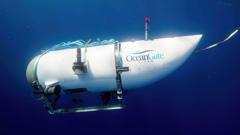The Titan submersible, operated by OceanGate, tragically imploded during its expedition to the Titanic wreck due to serious engineering issues, as confirmed by a recently released report from the U.S. National Transportation Safety Board (NTSB).
The incident, which took place in June 2023, resulted in the deaths of all five individuals on board, including Stockton Rush, the CEO of OceanGate. The NTSB’s findings revealed a lack of sufficient testing on the Titan, leading to the conclusion that the engineering practices behind the vehicle were inherently flawed and did not meet essential durability standards.
The report criticizes OceanGate's safety culture, suggesting that while some employees viewed safety as a priority, many others reported a disturbing environment where safety concerns were overlooked. This systemic failure in safety protocols played a critical role in the disaster.
Notably, the Titan disappeared during its dive to the Titanic wreck, which is located approximately 3,880 meters underwater, while the Titan imploded at 3,363 meters. The passengers, who paid as much as $250,000 each for the dive, included seasoned explorers and family members.
The NTSB has recommended a review of current regulations to improve the safety of so-called pressure vessels that carry people and ensure compliance with established industry standards.
As a cautionary tale, this tragedy emphasizes the essential need for rigorous standards in experimental submersible operations to safeguard lives in future endeavors.




















